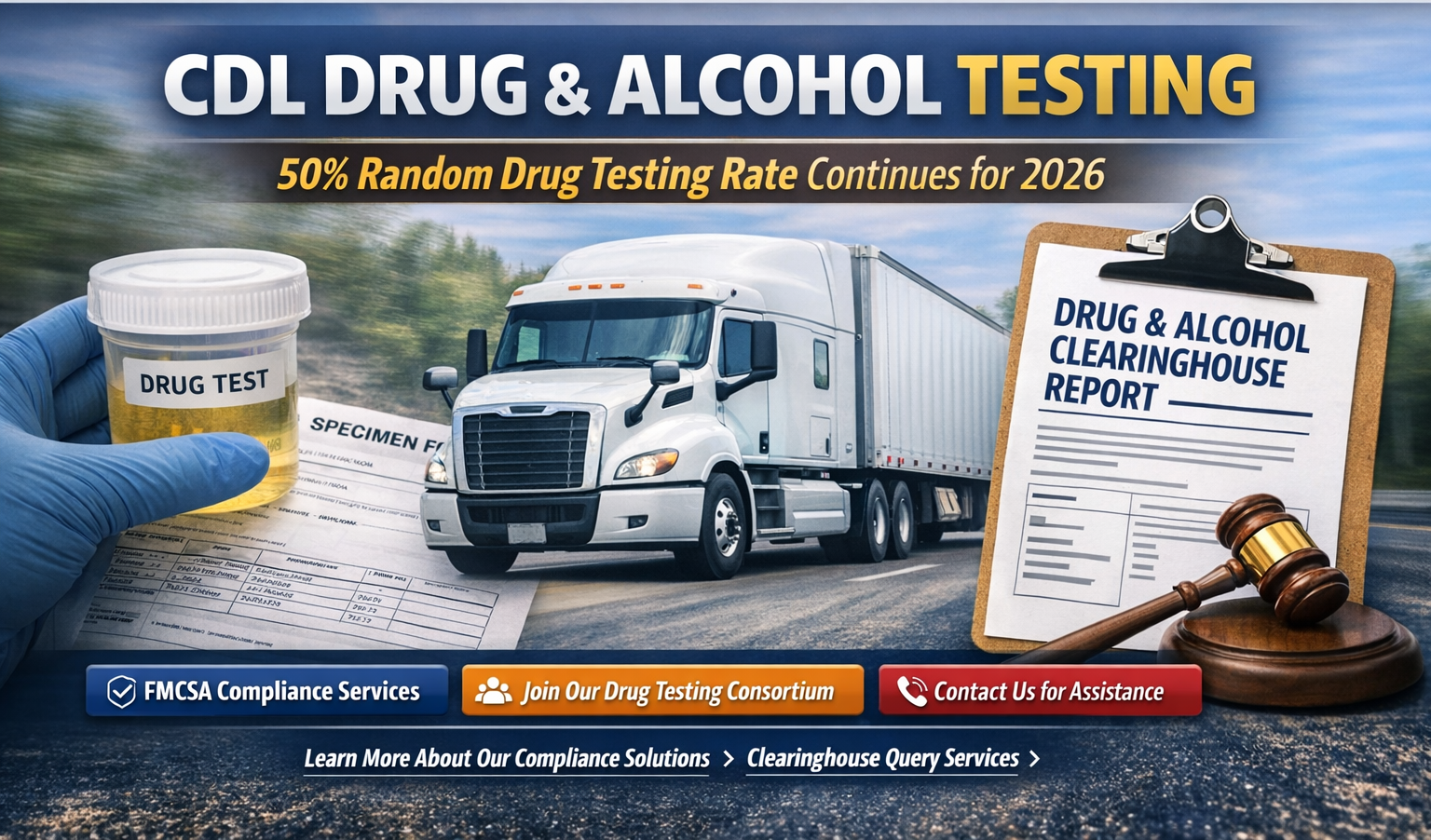What is Fleet Management?
November 20, 2025
Share this article:
Fleet management is the strategic oversight and coordination of a company’s commercial vehicles to ensure safe, efficient, and compliant operations. It encompasses a wide range of responsibilities, from tracking vehicle maintenance and monitoring driver performance to managing fuel usage and maintaining regulatory compliance with agencies like the Federal Motor Carrier Safety Administration (FMCSA).
For businesses that rely on transportation and logistics, especially those in the trucking industry, fleet management is critical. A well-managed fleet helps reduce risk, control costs, and keep operations running smoothly.
Core Components of Fleet Management
1. Vehicle Maintenance
Vehicle maintenance is one of the most fundamental aspects of fleet management. By implementing regular inspections and a preventative maintenance schedule, businesses can extend the life of their vehicles, reduce the risk of breakdowns, and keep repair costs under control. Proper maintenance not only protects the company’s investment but also ensures vehicles are safe and roadworthy, which is crucial for compliance with DOT regulations.
A strong fleet maintenance program typically includes oil changes, brake inspections, tire rotations, and attention to wear-and-tear components. Many companies also use maintenance tracking software to receive alerts for scheduled services, which helps reduce unplanned downtime and improves operational efficiency.

2. Driver Management
Drivers are the front line of any fleet-based operation. Their performance, qualifications, and behavior on the road have a direct impact on safety, compliance, and the company’s reputation. Driver management includes recruiting qualified drivers, maintaining up-to-date Driver Qualification (DQ) files, ensuring drivers are medically certified, and regularly reviewing Motor Vehicle Records (MVRs).
Training and safety programs are also critical to ensuring drivers understand company policies, FMCSA regulations, and best practices for safe driving. Consistent communication and performance reviews can reinforce safe habits and reduce violations, accidents, and liability.
3. Regulatory Compliance
Compliance is not optional in fleet management—it’s a legal necessity. The DOT and FMCSA have extensive regulations that govern commercial vehicle operations, covering everything from Hours of Service (HOS) to vehicle inspections and drug testing. Fleet managers must stay on top of regulatory changes, ensure proper recordkeeping, and be prepared for audits or roadside inspections at any time.
Non-compliance can result in hefty fines, loss of operating authority, and damage to the company’s reputation. As such, having a compliance partner or platform—like National Fleet Services’ DOTFocused software—can make staying audit ready far more manageable.
4. Fuel Management
Fuel is one of the largest operating costs for any fleet. Efficient fuel management not only saves money but also supports environmental sustainability. Fleet managers track fuel usage across vehicles, monitor fuel economy, and look for trends that could indicate vehicle issues or inefficient driving behavior.
Implementing route optimization, reducing idling time, and providing driver training on fuel-efficient driving techniques can significantly lower fuel costs. Many companies also use fuel cards and telematics data to track usage and reduce unauthorized purchases.
5. Safety and Risk Reduction
Accidents and unsafe driving can lead to injury, liability claims, regulatory penalties, and higher insurance premiums. Fleet safety management involves identifying risks, implementing preventative measures, and responding quickly to incidents when they occur.
This includes installing dash cams or telematics systems to monitor behavior, providing regular safety training, and setting clear policies for reporting and investigating incidents. A proactive approach to safety protects drivers, reduces downtime, and strengthens a company’s reputation with clients and regulators.
6. Fleet Tracking and Telematics
Modern fleet management relies heavily on data. GPS tracking and telematics solutions provide real-time visibility into vehicle locations, speeds, routes, and performance metrics. This technology helps dispatchers make smarter decisions, improves customer service, and allows for more accurate delivery ETAs.
Telematics
can also alert managers to engine diagnostics, detect harsh driving events like hard braking or speeding, and support compliance by automatically recording HOS data for ELD compliance. Data-driven decision-making is essential to operating a high-performing, cost-effective fleet.
How National Fleet Services Supports Fleet Management
At National Fleet Services, we specialize in helping small to mid-sized trucking companies and fleet-based businesses maintain full DOT compliance and streamline their operations. With over 20 years of experience, we understand the unique challenges our clients face and offer tailored support that blends expert consulting with cutting-edge technology.
Here are some of the ways we help your fleet succeed:
- Driver Qualification (DQ) File Management: We help ensure your drivers meet all regulatory requirements, with real-time monitoring and alerts for missing or expired documentation.
- Motor Vehicle Record (MVR) Monitoring: Our platform automatically reviews and flags potential issues in driver records, helping you respond to risks before they lead to violations or accidents.
- Electronic Logging Device (ELD) Oversight: We offer support for managing HOS logs and staying compliant with ELD mandates, reducing your administrative burden and avoiding costly citations.
- Drug and Alcohol Testing Program Management: From pre-employment to random testing, we administer DOT-compliant programs that help keep your workplace safe and your fleet compliant.
All of these services are delivered through our proprietary fleet management platform, DOTFocused, which centralizes compliance tasks, automates monitoring, and provides an easy-to-use dashboard to keep your operations audit ready and fully aligned with FMCSA regulations.
Why Fleet Management Matters
Fleet management is not just about logistics—it’s a strategic investment in your business’s long-term success. When done well, it ensures your vehicles are in top condition, your drivers are safe and qualified, and your operations are fully compliant with all DOT regulations. It also helps you:
- Reduce Costs: By cutting down on unnecessary repairs, improving fuel efficiency, and avoiding fines.
- Improve Safety: Through driver oversight, training programs, and proactive risk management.
- Enhance Compliance: With a system that tracks and automates critical tasks to keep you audit ready.
- Gain Operational Visibility: Via telematics and centralized data that inform better business decisions.
In today’s competitive landscape, businesses that proactively manage their fleets have a clear advantage. They’re more agile, more responsive, and better equipped to grow without the burden of compliance risks.
Get Started with National Fleet Services
Whether you're just beginning to formalize your fleet management strategy or you're looking to enhance your existing program, National Fleet Services is here to help. Our team of compliance experts and our DOTFocused platform are designed to simplify fleet management, reduce risk, and keep your operations running smoothly.
Request a Demo today to learn how National Fleet Services can support your fleet’s performance and compliance goals. Let us help you stay audit ready, reduce risk, and focus on what matters most: running a successful business.
fleet insights






